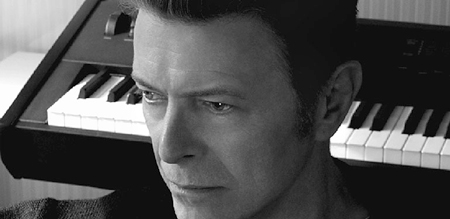by Robert Rollin

Inspired by the Strauss work in his writing of Heathen, Bowie is quoted as saying that he “wanted to start something that captured some of the gravitas, the spiritual questioning, that was so evident in those four songs of his.”
The afternoon’s rendition of Sunday featured attractive woodwind writing, especially in the clarinets, while the strings took the place of guitars and synthesizers. Singing the words “It’s the beginning of nothing, and nothing has changed,” Kline sounded uncannily similar to Bowie. Williams’ performance of “Im Abendrot” was excellent. Her voice, never strident, always managed to clear Strauss’s thick instrumental texture.
Kline sang four more Bowie songs. Time (1972) was performed in a cabaret-style arrangement with light orchestration. During the refrain on “la, la, la,” Kline matched the original’s tongue-in-cheek tone. The performance of Ziggy Stardust (1972-3) matched the original’s easy-going, hard rock flavor. One could not help missing the wonderful guitar solo from the original Moonage Daydream (1971). Similarly in Lazarus (2016), Bowie’s swansong, the arrangement could not live up to the original, with its wonderful guitar/saxophone duet, its extended saxophone solo, and its twangy hard-rock sound. However, hearing Kline perform the four songs was a treat.
The first half included an excellent performance of American composer John Adams’ Short Ride in a Fast Machine. The frequently performed piece begins with insistent woodblock rhythms. The orchestra runs a gauntlet through this rhythmic tunnel. Though the original score calls for a huge orchestra, Dorman and CityMusic were able to compensate for their smaller forces with energy and enthusiasm.
Surprisingly, two of Philip Glass’s symphonies were inspired by the experiments of Bowie and Brian Eno in avant-garde and world music. The two movements played on Sunday were from the Heroes Symphony, after Bowie’s album of the same name.
The first, “Heroes,” featured Glass’s insistently repetitious style with the clarinets supported by two alternating. Descending scales dominated, while chimes and horns helped vary the color. The second, “Sons of the Silent Age,” added rhythmic oboe and cello solos, and cross-rhythms in the violins. The movement closed with horns alternating with woodwinds, xylophone, and glockenspiel.
Anthony Fiumara’s Bowie XL provided a kaleidoscopic digest of Bowie’s career. CityMusic supplied its own narration, which was performed enthusiastically by Anjanette Hall. As each different period in Bowie’s career was brought to life, song snippets poked their way out of the complex texture.
Published on ClevelandClassical.com March 28, 2017.
Click here for a printable copy of this article


